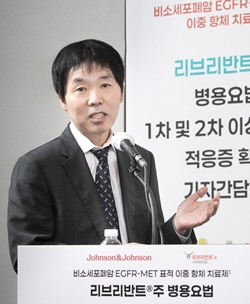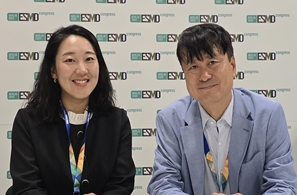- Janssen’s Rybrevant challenges the NSCLC throne
- by Whang, byung-woo | translator Alice Kang | Apr 25, 2025 05:59am
With three additional indications for EGFR-mutated non-small cell lung cancer added this year, the company plans to leverage its leadership in the field of lung cancer.

Results of 3 major Phase III clinical studies of Rybrevant in the treatment of EGFR-mutated non-small cell lung cancer were shared at the conference.
Kihyung Lee, Professor of Hemato-oncology at Chungbuk National University Hospital, who presented at the event, said, “A significant number of patients with EGFR exon 19 deletion and exon 21 (L858R) substitution mutations experience resistance during treatment with existing EGFR-TKIs, with limitations in selecting subsequent treatment options.” He added, “Rybrevant has presented a new treatment method for EGFR-mutated non-small cell lung cancer through the use of combination therapy.”
Rybrevant is the first targeted therapy for EGFR exon 20 insertion mutation non-small cell lung cancer, and it not only targets EGFR exon 20 insertion mutations but also simultaneously targets MET mutations.
Professor Lee said, “Rybrevant inhibits tumor growth and progression by suppressing tumor cells that show not only EGFR mutations but also MET mutations and amplification. It also has a differentiated mechanism of action that induces cancer cell death through immune mechanisms such as natural killer cells and macrophages.”
Rybrevant + Leclaza shows improvement in OS following PFS
The basis for adding the new indication for Rybrevant in EGFR-mutated non-small cell lung cancer was 3 Phase III clinical studies: MARIPOSA-1, MARIPOSA-2, and PAPILLON.
According to the final results of the MARIPOSA Phase III clinical study presented at the European Lung Cancer Congress (ELCC 2025) held in March, showed that the combination therapy of Rybrevant and Leclaza was superior to Tagrisso monotherapy.
The MARIPOSA study is a clinical trial comparing the efficacy and safety of Leclaza + Rybrevant combination therapy with Tagrisso monotherapy, which is currently used as a first-line treatment for EGFR-positive non-small cell lung cancer.
The clinical results showed that the median progression-free survival (PFS) in the Leclaza+Rybrevant group was 23.7 months, which was longer than the 16.6 months recorded in the monotherapy group. In the analysis of overall survival (OS), the secondary endpoint, the Leclaza+Rybrevant group showed a favorable trend compared to the Tagrisso monotherapy group.

With Leclaza + Rybrevant confirming its superiority in OS, the EGFR-positive non-small cell lung cancer treatment market is now likely to see combination therapy become the standard treatment.
Currently, this combination therapy has been approved as a first-line treatment in South Korea, the United States, Europe, Japan, the United Kingdom, and Canada.
Particularly, while combination therapy that combines platinum-based chemotherapy with targeted therapy has been approved for EGFR-positive NSCLC in the past, this is the first time a targeted therapy+targeted therapy option has been approved, signifying its significant development.
More options available for EGFR-positive NSCLC, but tailored selection remains a challenge
However, despite the combination rising as a possible standard treatment, there are cost barriers to its immediate use in clinical practice.
With four options now available, including monotherapy and combination therapy, determining the optimal sequence of treatment is also a key consideration.
Professor Lee said, “It is a difficult issue, but with 100 patients that all have different characteristics, I think their conditions must be taken into consideration. Rather than categorizing specific groups, I expect that the most beneficial treatment for each will be selected according to each patient's condition.”
In addition, Janssen Korea expressed its commitment to improving access to combination therapy with Rybrevant.
Yeon-hee Kim, Oncology Business Unit Director at Janssen Korea, added, “We are making various efforts to expand access to Rybrevant combination therapy. We will do our best to ensure that health insurance reimbursement coverage is provided through flexible and active cooperation during the reimbursement review process.”
-

- 0
댓글 운영방식은
댓글은 실명게재와 익명게재 방식이 있으며, 실명은 이름과 아이디가 노출됩니다. 익명은 필명으로 등록 가능하며, 대댓글은 익명으로 등록 가능합니다.
댓글 노출방식은
댓글 명예자문위원(팜-코니언-필기모양 아이콘)으로 위촉된 데일리팜 회원의 댓글은 ‘게시판형 보기’와 ’펼쳐보기형’ 리스트에서 항상 최상단에 노출됩니다. 새로운 댓글을 올리는 일반회원은 ‘게시판형’과 ‘펼쳐보기형’ 모두 팜코니언 회원이 쓴 댓글의 하단에 실시간 노출됩니다.
댓글의 삭제 기준은
다음의 경우 사전 통보없이 삭제하고 아이디 이용정지 또는 영구 가입제한이 될 수도 있습니다.
-
저작권·인격권 등 타인의 권리를 침해하는 경우
상용 프로그램의 등록과 게재, 배포를 안내하는 게시물
타인 또는 제3자의 저작권 및 기타 권리를 침해한 내용을 담은 게시물
-
근거 없는 비방·명예를 훼손하는 게시물
특정 이용자 및 개인에 대한 인신 공격적인 내용의 글 및 직접적인 욕설이 사용된 경우
특정 지역 및 종교간의 감정대립을 조장하는 내용
사실 확인이 안된 소문을 유포 시키는 경우
욕설과 비어, 속어를 담은 내용
정당법 및 공직선거법, 관계 법령에 저촉되는 경우(선관위 요청 시 즉시 삭제)
특정 지역이나 단체를 비하하는 경우
특정인의 명예를 훼손하여 해당인이 삭제를 요청하는 경우
특정인의 개인정보(주민등록번호, 전화, 상세주소 등)를 무단으로 게시하는 경우
타인의 ID 혹은 닉네임을 도용하는 경우
-
게시판 특성상 제한되는 내용
서비스 주제와 맞지 않는 내용의 글을 게재한 경우
동일 내용의 연속 게재 및 여러 기사에 중복 게재한 경우
부분적으로 변경하여 반복 게재하는 경우도 포함
제목과 관련 없는 내용의 게시물, 제목과 본문이 무관한 경우
돈벌기 및 직·간접 상업적 목적의 내용이 포함된 게시물
게시물 읽기 유도 등을 위해 내용과 무관한 제목을 사용한 경우
-
수사기관 등의 공식적인 요청이 있는 경우
-
기타사항
각 서비스의 필요성에 따라 미리 공지한 경우
기타 법률에 저촉되는 정보 게재를 목적으로 할 경우
기타 원만한 운영을 위해 운영자가 필요하다고 판단되는 내용
-
사실 관계 확인 후 삭제
저작권자로부터 허락받지 않은 내용을 무단 게재, 복제, 배포하는 경우
타인의 초상권을 침해하거나 개인정보를 유출하는 경우
당사에 제공한 이용자의 정보가 허위인 경우 (타인의 ID, 비밀번호 도용 등)
※이상의 내용중 일부 사항에 적용될 경우 이용약관 및 관련 법률에 의해 제재를 받으실 수도 있으며, 민·형사상 처벌을 받을 수도 있습니다.
※위에 명시되지 않은 내용이더라도 불법적인 내용으로 판단되거나 데일리팜 서비스에 바람직하지 않다고 판단되는 경우는 선 조치 이후 본 관리 기준을 수정 공시하겠습니다.
※기타 문의 사항은 데일리팜 운영자에게 연락주십시오. 메일 주소는 dailypharm@dailypharm.com입니다.









